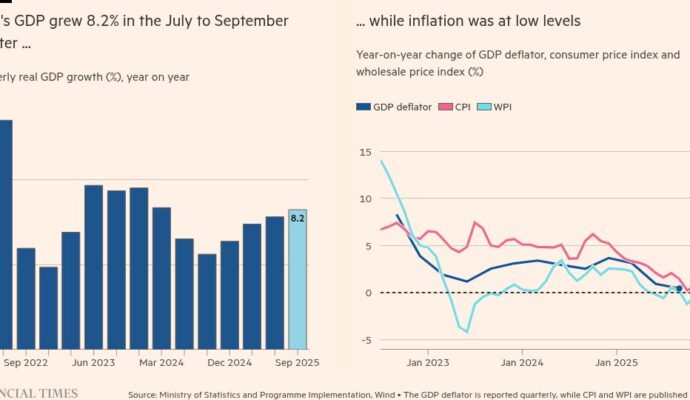Receive free Thailand updates
We’ll send you a myFT Daily Digest email rounding up the latest Thailand news every morning.
Thaksin Shinawatra, the populist former prime minister of Thailand, has returned to the country after 15 years in self-imposed exile as his Pheu Thai party is preparing for a vote in parliament to install its candidate as prime minister.
The charismatic former telecommunications magnate, who was deposed in a coup d’état in 2006, flew to Thailand from Singapore on Tuesday morning. “It’s time for me to be with the Thai people,” Thaksin told Nikkei Asia before boarding a private flight to Bangkok.
Thaksin will be taken into custody for numerous corruption-related cases, in which he was convicted in absentia in 2008, law enforcement authorities said on Monday. He faces 10 years in prison, but few political observers expect the former prime minister, who is 74, to serve significant time behind bars.
His return, broadcast on Thai television, precedes an expected vote in parliament on Tuesday on whether to approve a Pheu Thai candidate as prime minister.
Thailand has been locked in political stalemate since an election in May, when Move Forward, an upstart progressive party, shocked the country’s political elite by sweeping to victory on a pledge of wholesale reform of the powerful royalist-military establishment.
But Move Forward did not attract enough partners to form a government, in part because of its vow to amend Thailand’s controversial lèse majesté law, which imposes prison sentences of up to 15 years for insulting the monarchy.
Move Forward’s leader, 42-year-old Harvard- and Massachusetts Institute of Technology-educated Pita Limjaroenrat, fell short in the first prime minister vote last month. He was later blocked from contesting the post again and suspended from parliament pending an investigation into his ownership of shares in a defunct television broadcaster.
Pheu Thai, which finished second in May’s election, has put forward Srettha Thavisin, 61, a former property tycoon, to lead a controversial 11-party coalition that includes Pheu Thai’s erstwhile nemesis, the military-backed incumbent Palang Pracharath party and the United Thai Nation party. The latter is led by current prime minister Prayuth Chan-ocha, a former military chief who has ruled Thailand since he unseated Thaksin’s younger sister Yingluck in a 2014 coup.
Move Forward has said it will not back Srettha because of Pheu Thai’s co-operation with the military-backed groups. It will sit in the opposition.
Thaksin, who has lived mostly in Dubai since leaving Thailand in 2008, is the country’s most consequential political figure in decades, reviled by the conservative royalist-military establishment but admired by rural and working-class voters for his poverty alleviation policies.
A poll by the National Institute of Development Administration released on Sunday showed almost 65 per cent of respondents disapproved of Pheu Thai forming a coalition with the government-backed parties.
Srettha on Monday denied that the party had “misled” supporters despite pre-election vows that it would not join a coalition with military-backed parties. The party needed to “acknowledge the harsh realities and make difficult choices to progress and aid the people”, he said.
The next government will face considerable challenges following almost a decade of military rule in Thailand, including reviving south-east Asia’s second-biggest economy, which expanded just 1.8 per cent year on year in the second quarter.


